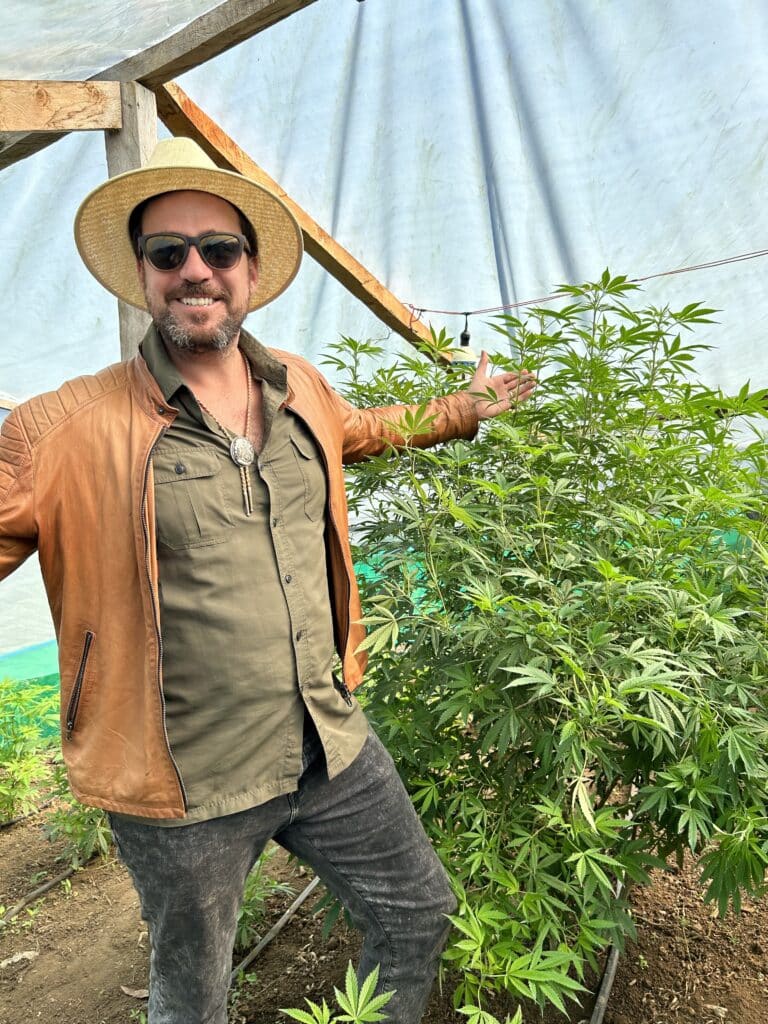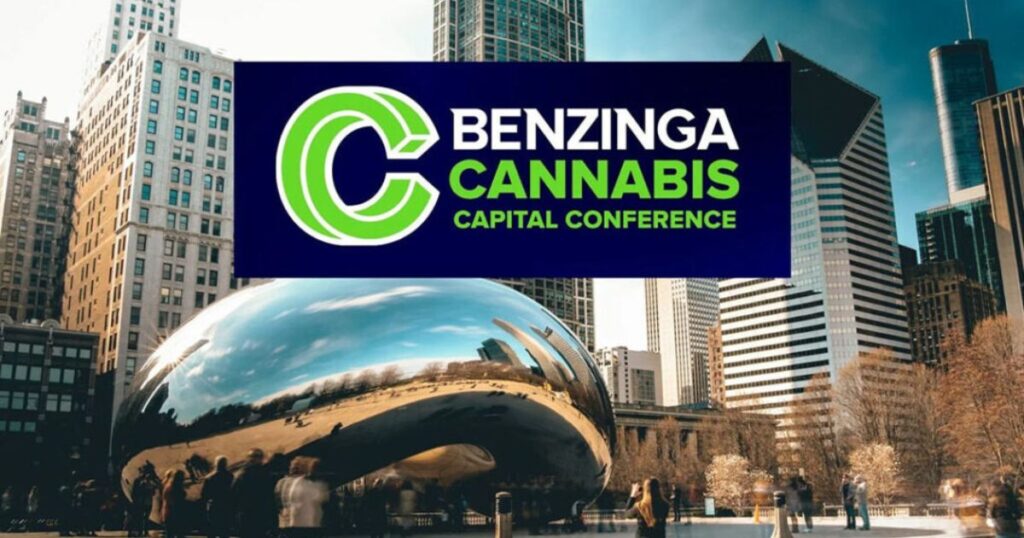The Benzinga Cannabis Capital Conference returned to the Marriott on Magnificent Mile in downtown Chicago last week to showcase the finance and operations side of an industry that continues to gain mainstream cultural acceptance and reach new markets globally despite considerable regulatory headwinds and economic pressures in the U.S.
When I told my Baby Boomer Chicago based In-laws that I was going to a cannabis conference, a roomful of poncho wearing Cheech and Chong stereotypes cackling with cartoonishly red eyes over bong loads of sticky sweet reefer smoke seemed to prematurely color their expectations.
Imagine their surprise later on when I recapped the panel sessions about tax strategy, debt refinancing, and supply chain solutions that punctuated my day otherwise spent wheeling and dealing with a crowd of financial analysts and insurance brokers in three piece suits.
Plus, Cheech & Chong are distinguished multinational executives now with 8-figure annual revenue in a heavily regulated legal industry.

A handful of key challenges facing the legal cannabis industry emerged as focal topics anchoring discourse across the three day conference, providing an opportunity for contextualization and scrutiny of these industry shaping issues:
Price Compression continues to throttle profitability in the fledgling legal cannabis industry. This is a result of oversupply, regulatory challenges and burdensome overtaxation, and a prevalent ‘Legacy’ or extralegal market that directly competes with the legal industry.
Intoxicating Hemp vs. State-Legal Cannabis continues to provoke controversy and divide market players, as well as the market itself. The 2018 Farm Bill provision that enabled the Intoxicating Hemp ‘loophole’ continues to pit industry stakeholders at odds with each other, where state legal recreational or medical companies that invested in expensive licensing and compliance schemes are now competing with operators selling legal cannabis nationally in the form of Hemp-derived Delta 9 THC.
Section 280E of the IRS tax code is inviting active resistance from cannabis sector players at large. While ostensibly designed to disrupt the activities of criminal enterprises trafficking in Schedule One substances, legal cannabis operators argue that they are exempt from this taxation due to a credible legal opinion that cannabis is inconsistent with the definition of a Schedule One substance.
But while these headwinds are indeed a set of inconvenient truths hampering the young legal cannabis industry, cooler heads and optimistic long-view forecasts of the sector prevail.
Regardless of the adversity that comes with operating in a heavily regulated emerging market in which price compression, overtaxation, debanking, and social media deplatforming are the norm rather than an exception, a palpable sense of purpose and vision seemed to handedly outweigh any sense of foreboding about the state of the legal cannabis industry throughout the 3 days of conference programming.
After kicking off Day One with a rooftop photo shoot alongside 3isFor founder JoJo Simmons and Lowd founder Jesce Horton arranged by superstar publicist Zoe Wilder, the first panel of the conference that I attended was titled “The CFO, The CPA & The CEO: How To Make Your Business Financially Resilient” – a necessary consideration across the board in an industry saddled with the inconvenient realities of price compression, constant regulatory challenges, and borderline overwhelming tax burdens.

“When you’re building a business, focus on what you know best,” said Terry Mendez of Safe Harbor Financials. “Focus on core competencies – don’t try to be everything to everyone.”
“I think you have to take a very long view on cannabis,” shares Andrew Berman of Arcana Collective in an exclusive interview for this article.
“I think the best analogy is probably the repeal of prohibition. With alcohol shortly after the repeal of prohibition, there had been a big illicit market, and even though bootleggers remained, the legal industry matured. Cannabis is not going away. 75% of the country lives in some form of legal cannabis.:
The true value of Benzinga Cannabis Capital for my money is its ability to serve as a unique backdrop to important conversations between the ‘roots and the suits’, placing two divergently motivated ends of the cannabis industry stakeholder spectrum in the same room together and enabling direct communication between these parties.
While the stultifying force of the internet often obfuscates community relations and industry dynamics, eye contact and face to face rapport building in the hallways, booths, private meeting rooms, and elevators make for an enormously valuable community building experience that drives evolution in the industry itself.
Seeing Dustin Hoxworth from Fat Nugz Magazine and Bill & Jeff Levers of the Beard Bros in the same room as Trulieve CEO Kim Rivers and Glasshouse CEO Kyle Kazan is an incredible example of the types of representation from across cannabis that Benzinga facilitates.
While values and visions for the future of legal cannabis vary drastically among industry stakeholders, the first steps towards any type of meaningful amelioration and mutually beneficial change starts with the rare feat of in person proximity.
The cannabis industry is at times referred to as a ‘bifurcated market’ in regards to intoxicating hemp vs. state legal cannabis, but there’s definitely more to the story.
It can also be framed as a ‘quadfurcated’ market; there’s legal vs. legacy but also recreational vs. medical – though is it really ‘vs.?’. While some frame it as such, the challenges certainly lay with the regulatory frameworks themselves and not with the plant.
There’s a crude and politically incorrect aphorism in emerging markets that says “the pioneers take the arrows, the settlers take the land” – In the legal cannabis industry, I wonder if the Donner party is a more accurate metaphor.
A rare industry wide solidarity front emerged during the panel “Taxed to the Max: How Operators Overcome Heavy Tax Burdens & Still Grow”.
“We’re a powerful industry” said Sam Armenia of C21 Investment as the consensus among on stage panelists was that banding together and rejecting the increased tax burden of 280E as an industry is the only sensible move in a space already saddled with excise and state taxes amidst razor thin margins and senior debt.
Outside for a 420 break, I was careful to keep my second hand Double Purple Doja smoke away from the cannabis industry C-Suite guys milling about in tailored suits waiting for their town car – I’d hate for one of them to get a contact high.
After my first fat joint of the day, which admittedly was in the post-lunch hours rather than a wake and bake, the panels and corporate programming suddenly got a lot more interesting if I’m being honest.
I like to divide my conference days between stone cold sobriety and being high as a kite in the Himalayas, because that way it’s like I’m traveling with my own editor as my scattered notes and observations from earlier in the day suddenly start falling into place.
The importance of authentic storytelling in communicating your brand also emerged as a key theme throughout the conference. At one point a session panelist emphasized the need for operators to “Tell the story of how you grew the portfolio” – although if everyone in the audience was being honest when they did that, a RICO case would likely be opened right then and there. I mean…do trap houses count as retail spaces?
“We started selling pounds at $1600 and today you can buy pounds for $300 or $400 – if that’s the trajectory, don’t sign 5 year deals” was another juicy nug from a financial perspective surfaced during another one of the economic jargon-riddled panels.
Speaking as a consumer, corporate speak for “custy”, if price compression continues the way it’s been going in the industry, these MSO’s will be paying me to take weed off their hands in the coming months and years. And I’ll still ‘Just Say No’ to corporate cannabis.
One would think that a sensible solution for the industry is to self-regulate by focusing on growing craft cannabis and holding the line on what the market says it’s worth rather than trying to undercut other operators on pricing and racing to the bottom with mass produced ‘mids’, but then we wouldn’t have all these fun problems to solve.
I mean how much should a pound of weed cost? This is such a loaded question that it evokes impassioned and often rambling answers from anyone brave or arrogant enough to tussle with it, and the answer usually falls into one of two categories:
“Let the market decide”
And “People don’t buy sushi at 711”
This adage implies that people who prefer quality don’t don’t buy their sushi at 711 and the same is true for cannabis, though the statement is a bit ironic given that I’ve actually bought fire weed in the 711 parking lot many times in my life.
Cracking the German market: Navigating cannabis opportunities amid political change
A panel focusing on the legal German market stirred excitement in the room, if only because the people on stage were optimistic about the state of the German cannabis industry.
According to one panelist, cannabis from the legal market is significantly cheaper than legacy market products in Germany by a margin of 30-40%. I smell a parallel opportunity to Oktoberfest taking shape. The German market is medical, but anyone can get a medical card, even as a foreigner.
The excitement about international market developments was tempered by industry operators emphasizing the importance of getting profitable domestically in the United States before allocating resources towards international expansion.
“I can under emphasize the need for this industry to become profitable and to understand what it takes. And for the most part, a lot of that is a more intense focus on fewer things.
We know the international markets out there want our seeds. We will get there. But I think that it’s much more important for us to try to get our genetics out in the U.S. in a licensed way where we think about having 100 strains times 39 states times 20 competitors in every state” opined Michael Klein of Arcana Collective.
In the exhibition hall on the 7th floor, a robotic arm coating a multitude of joints in keef performs its duties before me on the showroom floor – I imagine traveling back in time to Mesopotamia and bringing this machine into the citadel square, blessing the inhabitants with expeditious and godlike keef technology.
Cannabis-infused beverages had a noticeable and growing presence on the showroom floor in the same way they do in storefronts and across DTC channels in the United States at large.
I pocketed several effervescent Hemp-derived THC infused beverages for home consumption purposes later on, and am pleased to report that the effects curve of the beverages lived up to the hype.
The abundance of ergonomically designed and technically proficient vaporizer technology and next gen rolling paper products cause me to fondly remember the many days and nights I’ve smoked out of an apple, hollowed out papaya tree branch, or even a potato – do not recommend that last one.
I was particularly pleased with the effects of the Beard Bros “ReFocus” THCV and CBG Yuzu Mint beverage concentrate that I picked up a sample of from their impressive booth display.
I can’t be the only one who is still largely unfamiliar with the various minor cannabinoids and the many potential combinations, synergies and desirable effect profiles that they present, but therein is one of the core competencies of Benzinga Cannabis Capital Chicago: I had an opportunity to interface with the Beard Bros themselves and learn about THCV and CBG, and in so doing continue learning about the different types of products and compounds on offer in the legal cannabis market and refining my role as a consumer in the process.

The last panel of the day I caught was titled “Is AI Part of Your Strategy?”
After a reverie in which I imagined a stoner version of the terminator escaping containment from an MSO lab and wreaking havoc on craft cannabis operations, I was gently lifted back to reality when I heard one of the panelists assuring me that AI won’t take my job, but someone who knows how to use AI will.
I’d like to see someone who knows how to use AI do a dab and then write cryptic and incoherent chicken scratch notes in the margins of their weekly planner turned field notebook, because that’s essentially my full-time job these days.
On the way out of the conference and into the urban Chicago jungle, billowing plumes of terpene rich cannabis aroma wafted into my sensory field from all directions. Blacked out town cars and SUVs arriving and departing with hedge fund managers and data scientists all subjected one and the same to curtains of THC smoke – though it’s possible some of it was actually THCa smoke.
I passed the Dutchie to the left hand side and took a moment to basque in the beauty of the scene. Then I felt so goof basking in the moment, I sparked another spliff.
The state of the cannabis industry today is a reflection of the people who uphold and operate it, and along these lines I’m extremely bullish on the future of the industry.
Cannabis entrepreneurs and enthusiasts are some of the most purpose-driven and resilient people you’ll find anywhere, and a growing sense of community and mutually-assured destruction – or success – is beginning to temper some of the imbalances that have arisen out of the ‘green rush’ extraction mindset that tipped the scales unfavorably towards price compression and regulatory capture in the early years of the legal market.
Departing Benzinga Cannabis Capital Chicago, I can’t help but feel like this is just the beginning of an extraordinary opportunity that comes along but once in a lifetime if ever at all: The opportunity for people to build their company and build an entire industry at the same time.

Dennis Walker is a satirist and multimedia producer who covers the global mushroom and cannabis spaces. He is best known as the Founder of the Mycopreneur platform. He has hosted over 200 mushroom entrepreneurs from 30+ countries on the Mycopreneur Podcast and regularly appears at conferences and festivals around the world as an emcee, keynote speaker, and panelist. Mycopreneur has been featured in Forbes, Rolling Stone, High Times, and numerous other globally prolific media platforms.
















